
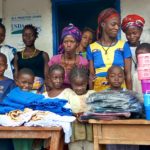

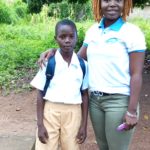


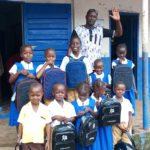
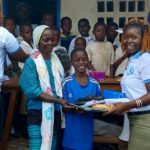
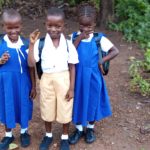




THE PROBLEM
According to U.N.I.C.E.F’s report about education, more than half of 15 year-olds and above (57%) are illiterate and half of those leaving primary school here in Sierra Leone are unable to read or write. The Government faces a number of ongoing systemic challenges. Teacher quality is wanting, Just 61% of primary school teachers are trained and, across the entire teaching workforce, nearly one third are unqualified and more than half are not on the government payroll.
These issues are compounded in rural areas where there are higher numbers of unqualified and volunteer teachers. The impact is reflected in low learning outcomes and poor exam results.
According to a study by U.N.F.P.A, 14,000 teenage girls became pregnant during Ebola and, in some communities, adolescent pregnancy increased up to 65%. When schools reopened, they were banned from returning under a GoSL directive preventing visibly pregnant girls from attending school or taking exams.
The lack of awareness in Falaba district on the importance of education and poverty coupled with gender, long distances to schools, families holding onto their cultural and traditional beliefs, marginalizing certain minority ethnic groups, discrimination, physical appearance to name but few are making things more impossible for majority of the children in this region to access quality education.
QUALITY EDUCATION – Sustainable Development Goal 4 ( SDG 4)
In 2019, of those students who sat exams, 76% passed the N.P.S.E; 57% passed the B.E.C.E; and just 26% passed the W.A.S.S.C.E, of whom just 6% qualified for entry into degree programmes. Educational challenges have been exacerbated by external shocks. Even before Ebola, in 2013, 28% of girls aged 15–19 had already begun childbearing, leaving
Sierra Leone ranked 10th highest in the world for adolescent pregnancy, and nearly 3 out of every 10 girls out-of-school are excluded from education.
When Ebola hit and schools closed for nine months, adolescent pregnancy spiked and girls experienced higher dropout rates as a result of pregnancy, domestic violence, and sexual abuse.
- This data also demonstrates the significant under-representation of girls at SSS level
(GER of 54.5% for girls against 58.5% for boys; difference of 4%), compared to other
levels where GER for girls is either at parity with or higher than boys. - District Gross Enrollment Rate (GER) J.S.S and S.S.S
- Bo J.S.S => 87% SSS => 60%
- Bombali J.S.S => 94% SSS => 76%
- Bonthe J.S.S => 58% SSS => 36%
- Falaba J.S.S => 31% SSS=> 10% (Our target district)
- Kailahun J.S.S => 47% SSS => 30% (Our target district)
- Kambia J.S.S => 75% SSS => 40%
- Karene J.S.S => 60% SSS=> 23%
- Kenema J.S.S => 85% SSS => 65%
- Koinadugu J.S.S => 67% SSS => 44%
- Kono J.S.S => 82% SSS => 49%
- Moyamba J.S.S => 59% SSS => 22%
- Port Loko J.S.S => 86% SSS=> 45%
- Pujehun J.S.S => 30% SSS => 10% (Our Target District)
- Tonkolili J.S.S => 67% SSS => 37%
- Western Area Rural J.S.S => 113% SSS => 94%
THE SOLUTION
What we want to do.
- Recruit 2000 marginalized adolescent mothers from economically disadvantaged background in Falaba district
- Register them into Community Based Secondary Schools
- Train them on accountability, roles of girls in nation development, Leadership roles (To prepare them for leadership positions and decision making in their communities’ leadership and country’s politics and even beyond)
- After school, capacity building training based on their talent areas
- Give them full academic support such as school materials and school charges
- Provide them free mentorship program to prepare them to become leaders and entrepreneurs
PROJECT OUTCOME
In the next 10 years, YoMsuD–SL is looking forward to reduce the percentages highlighted earlier within the Falaba – Kailahun and Pujehun district and also ensure that the sustainable development goal 4 is achieved within these district and beyond by 95%.
Nevertheless , we want to see these beneficiaries partake in societal development and help change the mindset of the people that all children deserve a quality education either formally or informal.
BENEFICIARIES
- School Drop outs
- Teenage Mothers
- Sexually Abused Adults
- Disables
- Pupils or Adults from Poor Financial Backgrounds
WHAT WE WANT
To undertake such project , YoMsuD – SL is looking to the following :
- Donors
- Partnership
- Finance